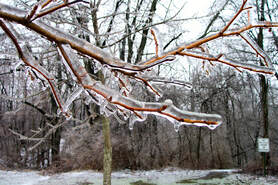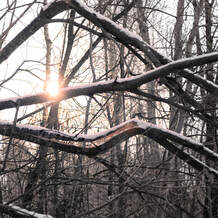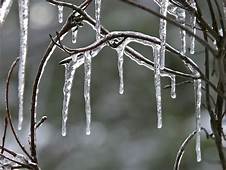Written by Admin and published on https://www.arboraesthetics.com/
First, some of the “do’s.” If the lower branches on evergreens are bending, these can be propped up with boards to keep them from snapping. If the branches have bend so they are already touching the ground, they should be left in place as the ice weight is now being supported by the ground. However if the branches are at risk of bending further, place a wooden support under the branch and gentle lift the branch up a little. The prop does not have to be high enough to restore the branch to its original position; it just has to support the weight.
ICE COVERED BRANCHES – DO’S AND DON’TS

With ice forecasted in the Omaha area, it’s likely your main concern is how your commute might be impacted. Trees generally aren’t at the forefronts of our minds until something bad happens – a broken branch, a split trunk, or in extreme cases, a tree lying on a roof.
While you’re out salting your sidewalk and notice your tree’s branches are coated in ice, there are more “DO’S” than “DON’TS” involved in keeping your tree healthy. (Hint: Prevention is key!) Let’s get the short list out of the way first:
DON’T SHAKE ICY TREE BRANCHES!
Simple. Trees coated in ice can be brittle and you’ll do more harm than good. You can even damage a tree’s circulatory system. While you might think the ice is weighing the tree down and should be removed, the branches are flexible and bent slowly to accommodate the extra weight. They should sustain this pressure without issue. Younger generally trees fare better in ice storms than older trees.
Now let’s talk about what you can DO to increase your tree’s resilience in an ice storm. Prevention is everything!
DO:

- STRUCTURALLY PRUNE. Prune trees starting at a young age to prevent crossing branches and narrow branch angles. We tend to see a lot of damage in pear trees and the recently trendy autumn blaze maple because of their narrow branch angles. A trained, Certified Arborist can prune a tree at a young age (no younger than 5 years old) to encourage it to grow a strong “leader.” Co-dominant branches and included bark are weak branch structures that can be prevented, but must be addressed at a young age.
- AVOID PLANTING TREES THAT ARE MORE SUSCEPTIBLE TO ICE DAMAGE.
- Trees with very upright branching structures like arborvitae
- Multi-stem or “clump” trees like river birch
- Faster growing species like maple, versus slow-growing oak
- Trees that naturally tend to grow with narrow branch angles like pear, autumn-blaze or silver maple
- PRUNE DAMAGED BRANCHES WITH CARE. If a branch fails in an ice storm, how you remove the damaged branch goes a long way toward how the tree recovers. If a branch rips, do not rip the branch further or cut into the trunk if it has ripped all the way back at the base. Trees have their own natural abilities to “seal” around damage to prevent the spread of decay, but improper pruning cuts can interfere with these mechanisms.
- CALL A CERTIFIED ARBORIST. A Certified Arborist is trained in the art and science of caring for trees. We KNOW things! If you don’t have the proper tools or just don’t know the best way to go about removing a damaged branch, call in a professional. Trees don’t come with manuals, and that’s why we’re here to help.
- HAVE YOUR TREES INSPECTED REGULARLY BY A PROFESSIONAL. Having your trees inspected on a regular basis is important. Annually is best. An experienced Arborist has a keen eye that can spot structural issues, minor cracks and signs of weakness before the homeowner can.
- CALL THE UTILITY COMPANY IF NEEDED. Don’t be shy. If a limb is close to a power line (within 10 feet) – it’s better to be safe than sorry. Call your local utility company. Energized branches look no different than non-energized branches!
Original post here https://www.arboraesthetics.com/blog/ice-covered-branches-dos-and-donts/.


